【讲语法】16 情态动词和虚拟语气高考英语语法知识点梳理课件(全国通用)(33张PPT)
文档属性
| 名称 | 【讲语法】16 情态动词和虚拟语气高考英语语法知识点梳理课件(全国通用)(33张PPT) |  | |
| 格式 | zip | ||
| 文件大小 | 1.9MB | ||
| 资源类型 | 教案 | ||
| 版本资源 | 通用版 | ||
| 科目 | 英语 | ||
| 更新时间 | 2022-11-19 13:08:30 | ||
图片预览

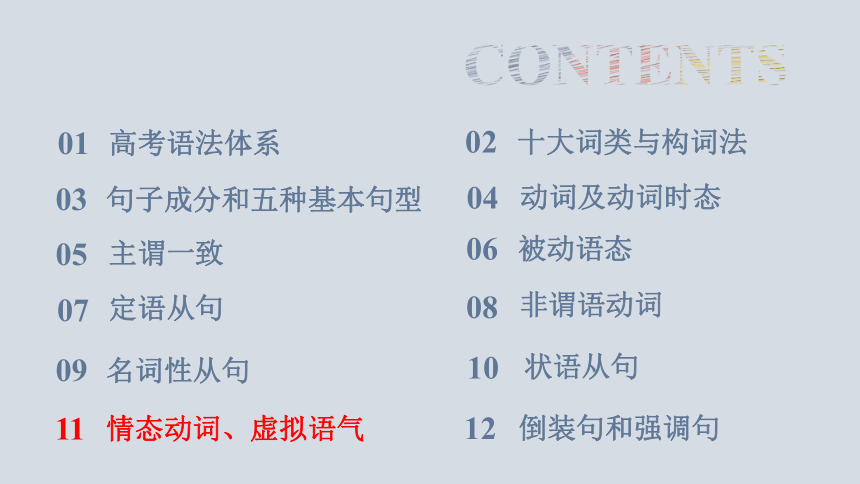
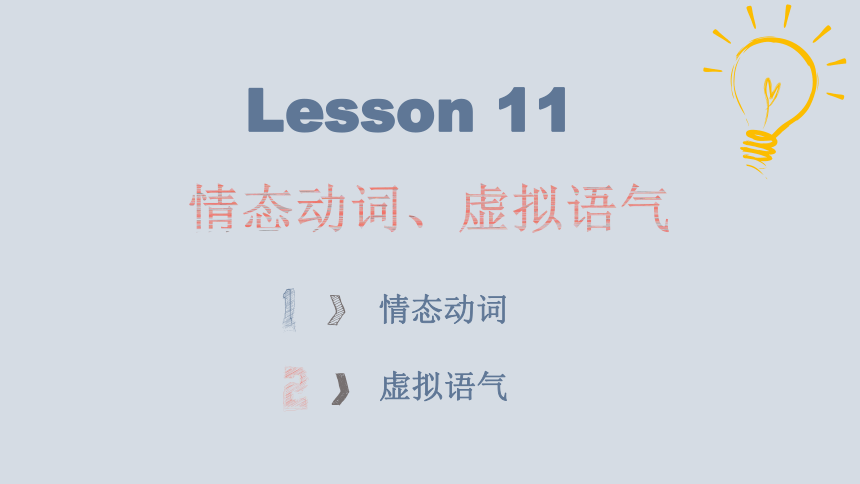
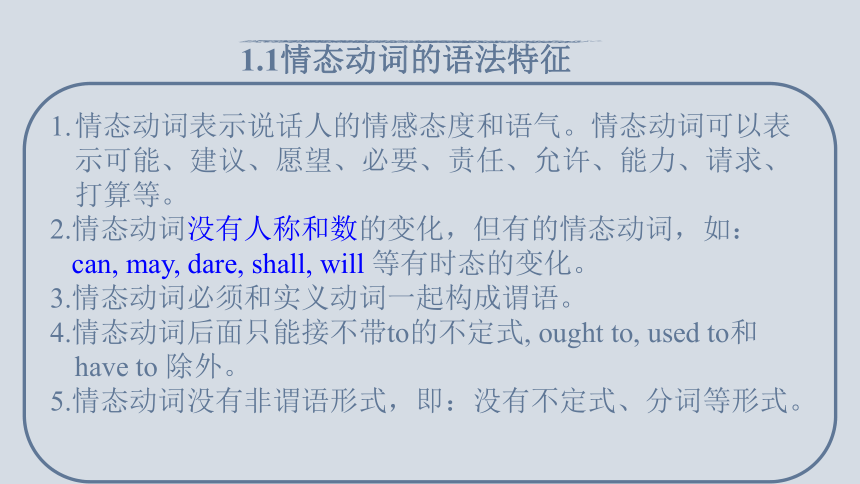
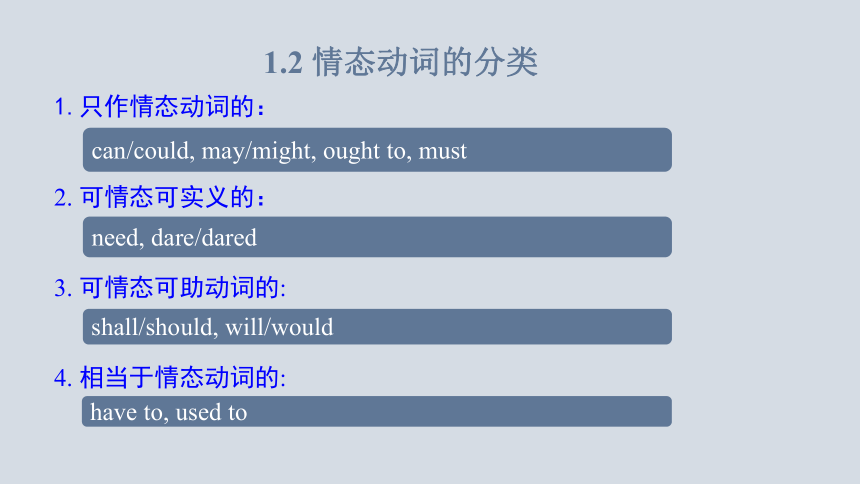
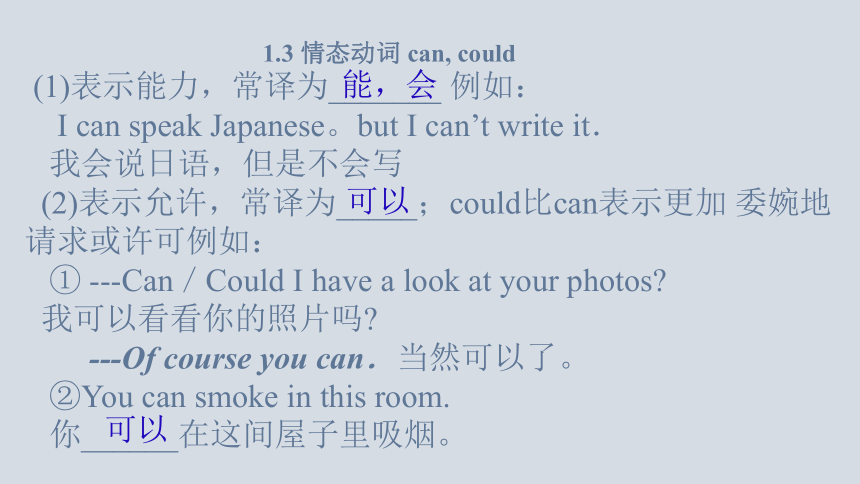
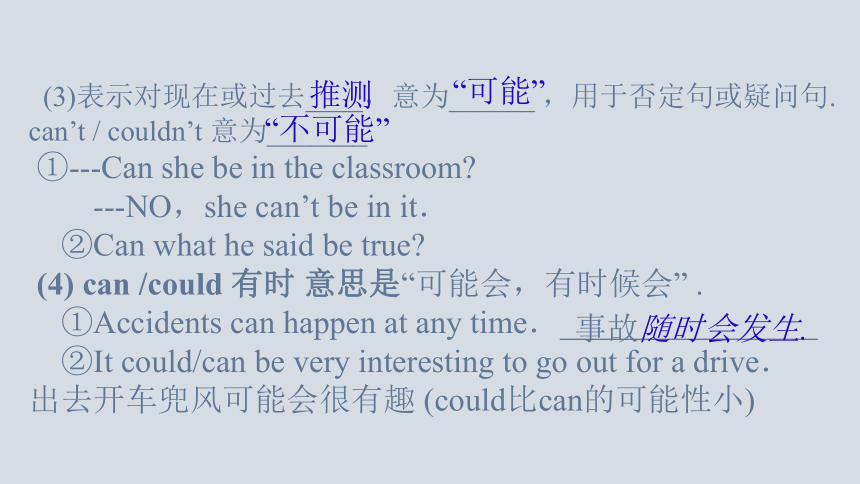
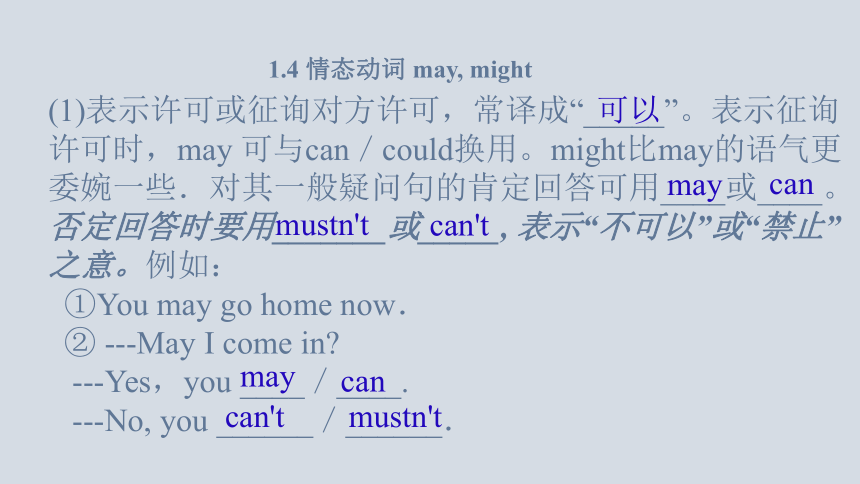
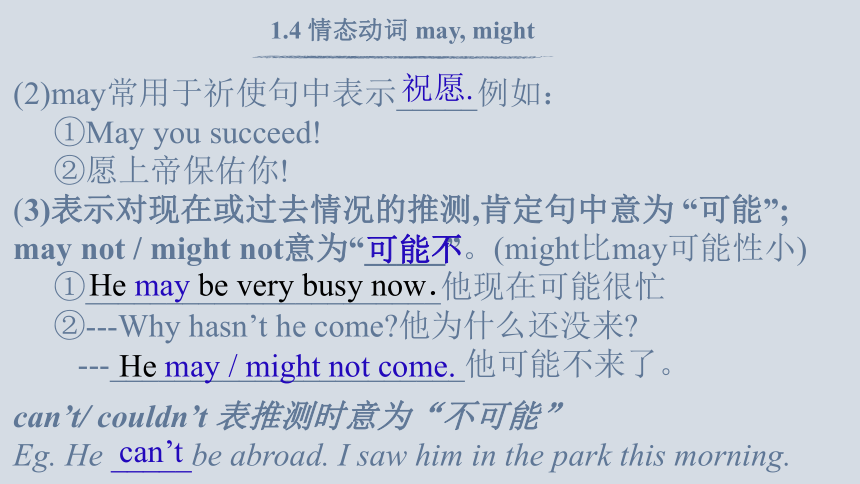
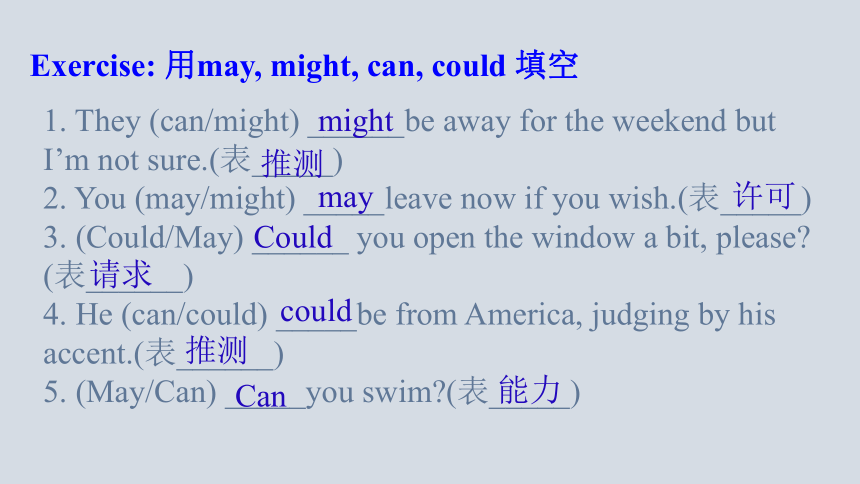
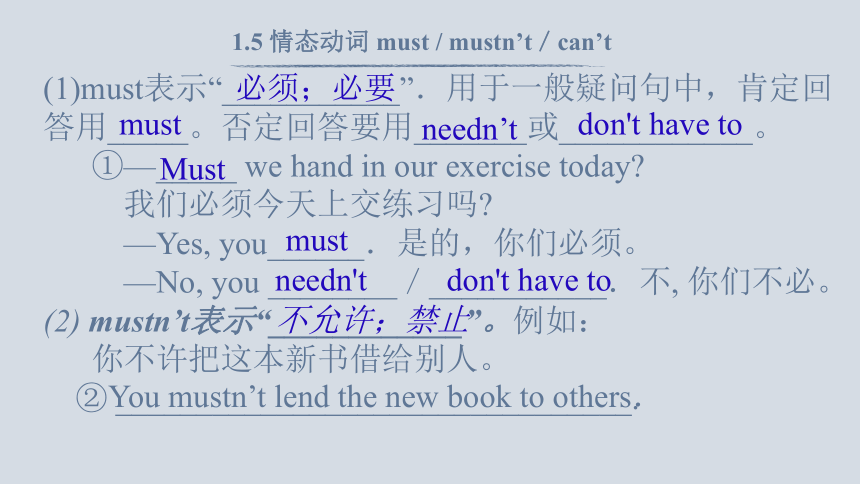
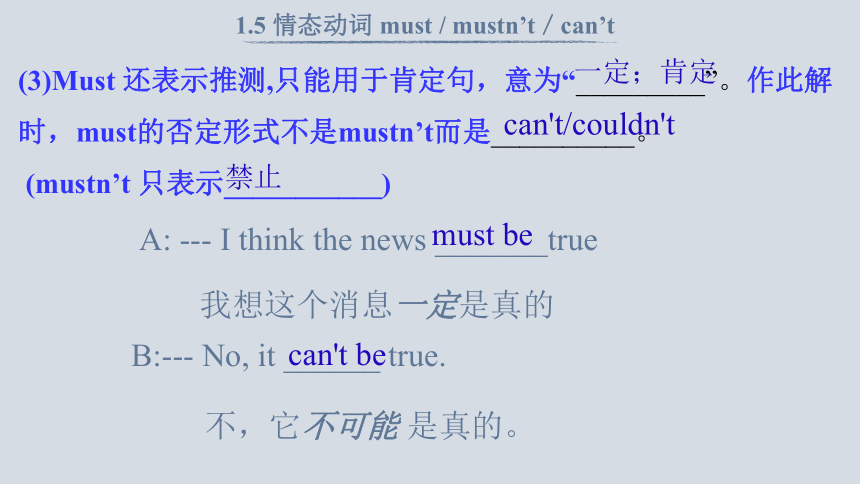
文档简介
(共33张PPT)
CONTENTS
十大词类与构词法
02
动词及动词时态
04
非谓语动词
08
名词性从句
09
情态动词、虚拟语气
11
倒装句和强调句
12
高考语法体系
01
句子成分和五种基本句型
03
被动语态
06
定语从句
07
状语从句
10
主谓一致
05
Lesson 11
情态动词、虚拟语气
情态动词
虚拟语气
情态动词表示说话人的情感态度和语气。情态动词可以表示可能、建议、愿望、必要、责任、允许、能力、请求、打算等。
2.情态动词没有人称和数的变化,但有的情态动词,如:
can, may, dare, shall, will 等有时态的变化。
3.情态动词必须和实义动词一起构成谓语。
4.情态动词后面只能接不带to的不定式, ought to, used to和have to 除外。
5.情态动词没有非谓语形式,即:没有不定式、分词等形式。
1.1情态动词的语法特征
1.只作情态动词的:
2. 可情态可实义的:
3. 可情态可助动词的:
4. 相当于情态动词的:
can/could, may/might, ought to, must
need, dare/dared
shall/should, will/would
have to, used to
1.2 情态动词的分类
(1)表示能力,常译为_______ 例如:
I can speak Japanese。but I can’t write it.
我会说日语,但是不会写
(2)表示允许,常译为_____;could比can表示更加 委婉地请求或许可例如:
① ---Can/Could I have a look at your photos
我可以看看你的照片吗
---Of course you can.当然可以了。
②You can smoke in this room.
你______在这间屋子里吸烟。
能,会
可以
可以
1.3 情态动词 can, could
(3)表示对现在或过去____,意为______ ,用于否定句或疑问句. can’t / couldn’t 意为_______
①---Can she be in the classroom
---NO,she can’t be in it.
②Can what he said be true
(4) can /could 有时 意思是“可能会,有时候会” .
①Accidents can happen at any time.________________
②It could/can be very interesting to go out for a drive.
出去开车兜风可能会很有趣 (could比can的可能性小)
推测
事故随时会发生.
“不可能”
“可能”
(1)表示许可或征询对方许可,常译成“_____”。表示征询许可时,may 可与can/could换用。might比may的语气更委婉一些.对其一般疑问句的肯定回答可用____或____。
否定回答时要用_______或_____, 表示“不可以”或“禁止”之意。例如:
①You may go home now.
② ---May I come in
---Yes,you ____/____.
---No, you ______/______.
可以
may
mustn't
can't
can
may
can
mustn't
can't
1.4 情态动词 may, might
(2)may常用于祈使句中表示_____例如:
①May you succeed!
②愿上帝保佑你!
(3)表示对现在或过去情况的推测,肯定句中意为 “可能”; may not / might not意为“_____”。(might比may可能性小)
①______________________他现在可能很忙
②---Why hasn’t he come 他为什么还没来
---______________________他可能不来了。
祝愿.
可能不
can’t/ couldn’t 表推测时意为“不可能”
Eg. He _____be abroad. I saw him in the park this morning.
can’t
He may be very busy now.
He may / might not come.
1.4 情态动词 may, might
Exercise: 用may, might, can, could 填空
1. They (can/might) ______be away for the weekend but
I’m not sure.(表_____)
2. You (may/might) _____leave now if you wish.(表_____)
3. (Could/May) ______ you open the window a bit, please
(表______)
4. He (can/could) _____be from America, judging by his accent.(表______)
5. (May/Can) _____you swim (表_____)
might
推测
许可
请求
推测
能力
may
Could
could
Can
(1)must表示“___________”.用于一般疑问句中,肯定回答用_____。否定回答要用_______或____________。
①—_____ we hand in our exercise today
我们必须今天上交练习吗
—Yes, you______.是的,你们必须。
—No, you ________/___________.不, 你们不必。
(2) mustn’t表示“____________”。例如:
你不许把这本新书借给别人。
② ________________________________.
必须;必要
must
don't have to
Must
needn’t
must
needn't
don't have to
不允许;禁止
You mustn’t lend the new book to others.
1.5 情态动词 must / mustn’t/can’t
(3)Must 还表示推测,只能用于肯定句,意为“_________”。作此解时,must的否定形式不是mustn’t而是__________。
(mustn’t 只表示___________)
A: --- I think the news _______true
B:--- No, it ______ true.
一定;肯定
can't/couldn't
must be
can't be
禁止
不,它不可能 是真的。
我想这个消息一定是真的
1.5 情态动词 must / mustn’t/can’t
(1) 用作情态动词, need意为“___________”, 一般用于
_______________。疑问句中把need提前, 否定形式是 needn't。
______________________________
你今天下午不必来。
(2) 用作实意动词, 意为“需要, 有必要”, 可以用于各种句式中. (need sth. / need to do sth./ need doing)
你不必现在就走。_____________________
他现在所需要的是信心。___________________________
My computer _________________________(需要修了)。
需要, 有必要
否定句或疑问句中
You needn’t come here this afternoon.(needn’t=__________)
You don’t need to go now.
What he needs now is confidence.
needs repairing
don’t have to
(=to be repaired)
1.6 need
(1) dare作情态动词时, 常用于疑问句、否定句和条件从句中, 过去式形式为______;否定式为________________。
________________________
(2)dare作实义动词用时, 有人称、时态和数的变化。在肯定句中, dare后面常接带 to的不定式,即: dare to do;在疑问句和否定句中, dare后面的动词不定时可省略to.
他不敢在这么多人面前说话, 是吗
_______________________________________________.
dared
How dare you say I’m unfair
daren’t or dare not
He daren’t speak before so many people, dare he
He doesn’t dare (to) speak before so many people, does he
1.7 dare
Exercise: 用need, dare 填空
1.—Must I stay here —No, you _______.
2.He _____not be told twice about one single thing.
3.Sarah ________ (不必)to hand in her task right now.
4.No one ____say the emperor had nothing on.
5. He said he _______ (不敢) to swim across this river.
6.I don’t_______________________at night.
夜晚我不敢单独一人待在家里。
needn't
need
doesn’t need
dared
didn’t dare
dare (to) stay at home alone
(1)表示请求、建议,用于第______人称疑问句中. would比will语气更委婉。例如:
①请过一会儿再打过来好吗
Will/ Would you call back later,please
②你想来杯咖啡吗
Would you like a cup of coffee
(2)表示意志、愿望和决心,有“_______”之意;would表示过去的_____和_____。例如:
第二
愿;要
意愿
决心
I will do my best to help you.
1.8 will/would
(1)shall用于_____、_____人称疑问句中,表示说话人征求对方的意见或向对方请求许可。例如:
①What shall we do this evening
我们今晚干什么呢
②When shall he be able to leave the hospital
他什么时间能离开医院
(2)shall用于_____、_____人称,表示说话人给对方命令、警告、允诺或威胁。例如:
①You shall fail if you don’t work hard.
②You shall not leave your post.
第三
第二
第三
第一
征询意见
请求许可
警告
命令
③ You shall have the book when I finish reading it.
当我读完这本书时你可以拿走。
④He shall be punished。他将受到惩罚。
(3)should表示劝告、建议、命令,其同义词是_________;在疑问句中,通常用should代替ought to,意为“应该”。 (4) should 还常用于虚拟语气中
___________________________________
ought to
威胁/警告
允诺
Sal suggested that we (should go) for a swim.
1.8 shall/should
用will, would, shall, should, must 或其否定形式填空
1. You ______ smoke here, because the worker is carrying some petrol.(表____)
2. It is dangerous. You ______ leave the room immediately.
(表____________)
3. He ______ go hiking with friends at weekends when young.
(表________)
4. ---Write to me when you get home.
---I ____.(表_____)
mustn’t
禁止
命令;必须
would
意愿
should/ must
过去习惯
will
5. You have been working all day. You _____be very tired.
(表____)
推测
must
1. should / ought to have done
2. shouldn’t have done
3. must have done
4. couldn’t/can’t have done
5. could have done
6. may / might have done
7. needn’t have done
8. would have done
1. 应该做(但未做)
2. 不应该做(但做了)
3. 一定做了某事
4. 不可能做了某事
5. 本可以做(但未做)
6. 可能已经做了(推测)/
可能发生(但没发生)
7. 没必要做(但做了)
8. 本要做(但未做)
1.8情态动词+have done
1. He can’t/couldn’t have finished so much work in so short a time.
2. We could have gone there on foot. A taxi wasn’t necessary at a11.
3. He may/might have said so.
4. That was too dangerous. You might have killed yourself.
5. Look, you needn’t have bought those sweaters for me. I have just knitted one.
6. It must have rained last night.
7. You should have started earlier.
8. You shouldn’t have lent him money yesterday.
9. I didn’t have enough money, otherwise I would have bought that book.
needn’t have done没必要做(但做了)
needn’t do 不必做(没做)
Look, you needn’t have bought those sweaters for me. I have just knitted one.
I didn’t need to clean the windows. My brother did it.
must+have done:表示对过去发生的动作的肯定推测, 表示 “__________”;其否定形式为___________________
一定做过...
can’t/couldn’t have done
It must have rained last night.
It can’t have rained last night.
2.1 虚拟语气
英语的动词一般可带有三种不同的语气:陈述语气,祈使语气和虚拟语气。不同的语气用动词的不同形式(有的还借助句法形式)来表示。
虚拟语气用来表示假设或事实与愿望相反。也可以表达某种强烈的感情,比如愿望、要求、命令、建议等等。虚拟语气通过谓语动词的特殊形式来表示。
如果我是你,我就会努力学习.
如果我知道他的电话号码,我就给他打电话了.
如果明天下雨的话,我们会取消比赛.
If I were you, I would work harder at my lessons.
If I had known his telephone number, I would have called him.
If it should \were to rain, we would call off the match.
虚拟语气 从句谓语动词 主句谓语动词
与现在事实相反 did/ were would/ should/ could/ might + do
与过去事实相反 had done would/ should/ could/ might + have done
与将来事实相反 did/were to do/should do would/ should/ could/ might + do
(1)在条件句中,可省略 if,把were ,had, should 提到句首,变为倒装句式.
If I were at school again, I would study harder.
Were I at school again, I would study harder.
If you had come earlier, you would have met him.
Had you come earlier, you would have met him.
If it should rain tomorrow, we would not go climbing.
Should it rain tomorrow, we would not go climbing.
(2)当从句表示的行为和主句表示的行为所发生的时间不一致时,被称为:错综时间条件句. 动词的形式要根据它所表
示的时间作出相应的调整.
If you had followed my advice , you would be better now.
If you had studied hard before, you would be a college student now.
(3) 含蓄虚拟条件句,通常借助这些词without, but for ( 要不是 ), or/ otherwise等来表达条件。 I couldn’t have succeeded without your generous help.
We got lost, otherwise we would have visited more places of interest yesterday.
(4)虚拟语气用于if only 引导的条件句或感叹句
If only I had known the news earlier! 要是我早知道这个消息就好了!
(5)虚拟语气在方式状语从句的运用
The lady treats the boy as if he were her own son.
(6) 虚拟语气用于目的状语从句
so that,in order that, in case(以免,以防), for fear that(以免,唯恐,)有时也用虚拟语气。
You should take an umbrella for fear that it (should) rain.
as if/as though意为“好像,仿佛”,从句所述的是非真实的情况,用虚拟语气;若所述的是事实或是极可能发生的情况,用陈述语气。可以引导方式状语从句,也可以跟在系动词seem,appear,look,taste,sound,feel,smell等之后引导表语从句。
as if/as though引导从句
表语从句:He looked as if he was going to cry.
He looks as if he were from the Mars.
状语从句:Do as you are told, or you’ll be fired.
The lady treats the boy as if he were her own son. (虚拟语气)
He closed his eyes as if he was tired. (陈述语气)
(1) suggest, propose, insist, desire, demand, request, order, command表示“建议、请求、要求、决定”等词后的宾语从句常用虚拟语气。如:
I insist that she (should) do her work alone.
(2) suggestion, proposal, request, decision等表示“建议、请求、要求、决定”等词后的表语从句中谓语动词要用虚拟语气"(should) +do"。如:
His suggestion is that we (should) hold another meeting to discuss the question.
(3) suggestion, proposal, request, decision,order等词后的同位语从句中谓语动词要用虚拟语气"(should)+do"。如:
They received orders that the work(should)be done at once.
如果suggest作“表明、暗示”讲, insist作“坚持说”讲,则其后的宾语从句中应该用陈述语气。
The smile on his face suggested that he had passed the examination.
He suggested that we should take action right now.
I insist that she (should) do her work alone.
He insisted that he had locked the door.
2.31 宾语从句中的虚拟语气
(1)wish 后面的宾语从句一般用虚拟语气,表示一种不可能实现的愿望。
I wish (that) I were a bird.
I wish (that) I had seen the film last night.
I wish (that) I would\could go.
对现在虚拟 过去时
对过去虚拟 过去完成时
对将来虚拟 would, might, could do
(2) would rather + 从句 动词用过去式或过去完成时
I would rather you told me the truth.
I would rather you had gone there last Sunday.
(3) suggest, propose, insist, desire, demand, request, order, command表示“建议、请求、要求、决定”等动词后的宾语从句常用虚拟语气。如:
I insist that she (should) do her work alone.
在句型 “It is important /necessary/strange/natural that sb (should) do
(1)我们有必要出去散散步。
It’s necessary that we (should) have a walk now.
(2)她这样做是很自然的。
It’s natural that she (should) do so.
(3)重要的是我们要照顾好病人。
It’s important that we (should) take good care of the patient.
2.32 主语从句中的虚拟语气
2. 在It is demanded/suggested/ordered/required that sb (should) do
It is demanded that we should work out a plan.
3. 在 It is a pity/a shame/ no wonder that sb (should) do
(表达某种强烈的情感)
It’s a pity that you (should) miss a good chance.
2.32 主语从句中的虚拟语气
(8) It is (high / about ) time that sb +过去式或should+动词原形,should不能省略.
It is high time that you went / should go to school.
(10) even if ( even though)即使
Even if he were here, he could not solve the problem.
Even if I had been busy then, I would have helped you.
CONTENTS
十大词类与构词法
02
动词及动词时态
04
非谓语动词
08
名词性从句
09
情态动词、虚拟语气
11
倒装句和强调句
12
高考语法体系
01
句子成分和五种基本句型
03
被动语态
06
定语从句
07
状语从句
10
主谓一致
05
Lesson 11
情态动词、虚拟语气
情态动词
虚拟语气
情态动词表示说话人的情感态度和语气。情态动词可以表示可能、建议、愿望、必要、责任、允许、能力、请求、打算等。
2.情态动词没有人称和数的变化,但有的情态动词,如:
can, may, dare, shall, will 等有时态的变化。
3.情态动词必须和实义动词一起构成谓语。
4.情态动词后面只能接不带to的不定式, ought to, used to和have to 除外。
5.情态动词没有非谓语形式,即:没有不定式、分词等形式。
1.1情态动词的语法特征
1.只作情态动词的:
2. 可情态可实义的:
3. 可情态可助动词的:
4. 相当于情态动词的:
can/could, may/might, ought to, must
need, dare/dared
shall/should, will/would
have to, used to
1.2 情态动词的分类
(1)表示能力,常译为_______ 例如:
I can speak Japanese。but I can’t write it.
我会说日语,但是不会写
(2)表示允许,常译为_____;could比can表示更加 委婉地请求或许可例如:
① ---Can/Could I have a look at your photos
我可以看看你的照片吗
---Of course you can.当然可以了。
②You can smoke in this room.
你______在这间屋子里吸烟。
能,会
可以
可以
1.3 情态动词 can, could
(3)表示对现在或过去____,意为______ ,用于否定句或疑问句. can’t / couldn’t 意为_______
①---Can she be in the classroom
---NO,she can’t be in it.
②Can what he said be true
(4) can /could 有时 意思是“可能会,有时候会” .
①Accidents can happen at any time.________________
②It could/can be very interesting to go out for a drive.
出去开车兜风可能会很有趣 (could比can的可能性小)
推测
事故随时会发生.
“不可能”
“可能”
(1)表示许可或征询对方许可,常译成“_____”。表示征询许可时,may 可与can/could换用。might比may的语气更委婉一些.对其一般疑问句的肯定回答可用____或____。
否定回答时要用_______或_____, 表示“不可以”或“禁止”之意。例如:
①You may go home now.
② ---May I come in
---Yes,you ____/____.
---No, you ______/______.
可以
may
mustn't
can't
can
may
can
mustn't
can't
1.4 情态动词 may, might
(2)may常用于祈使句中表示_____例如:
①May you succeed!
②愿上帝保佑你!
(3)表示对现在或过去情况的推测,肯定句中意为 “可能”; may not / might not意为“_____”。(might比may可能性小)
①______________________他现在可能很忙
②---Why hasn’t he come 他为什么还没来
---______________________他可能不来了。
祝愿.
可能不
can’t/ couldn’t 表推测时意为“不可能”
Eg. He _____be abroad. I saw him in the park this morning.
can’t
He may be very busy now.
He may / might not come.
1.4 情态动词 may, might
Exercise: 用may, might, can, could 填空
1. They (can/might) ______be away for the weekend but
I’m not sure.(表_____)
2. You (may/might) _____leave now if you wish.(表_____)
3. (Could/May) ______ you open the window a bit, please
(表______)
4. He (can/could) _____be from America, judging by his accent.(表______)
5. (May/Can) _____you swim (表_____)
might
推测
许可
请求
推测
能力
may
Could
could
Can
(1)must表示“___________”.用于一般疑问句中,肯定回答用_____。否定回答要用_______或____________。
①—_____ we hand in our exercise today
我们必须今天上交练习吗
—Yes, you______.是的,你们必须。
—No, you ________/___________.不, 你们不必。
(2) mustn’t表示“____________”。例如:
你不许把这本新书借给别人。
② ________________________________.
必须;必要
must
don't have to
Must
needn’t
must
needn't
don't have to
不允许;禁止
You mustn’t lend the new book to others.
1.5 情态动词 must / mustn’t/can’t
(3)Must 还表示推测,只能用于肯定句,意为“_________”。作此解时,must的否定形式不是mustn’t而是__________。
(mustn’t 只表示___________)
A: --- I think the news _______true
B:--- No, it ______ true.
一定;肯定
can't/couldn't
must be
can't be
禁止
不,它不可能 是真的。
我想这个消息一定是真的
1.5 情态动词 must / mustn’t/can’t
(1) 用作情态动词, need意为“___________”, 一般用于
_______________。疑问句中把need提前, 否定形式是 needn't。
______________________________
你今天下午不必来。
(2) 用作实意动词, 意为“需要, 有必要”, 可以用于各种句式中. (need sth. / need to do sth./ need doing)
你不必现在就走。_____________________
他现在所需要的是信心。___________________________
My computer _________________________(需要修了)。
需要, 有必要
否定句或疑问句中
You needn’t come here this afternoon.(needn’t=__________)
You don’t need to go now.
What he needs now is confidence.
needs repairing
don’t have to
(=to be repaired)
1.6 need
(1) dare作情态动词时, 常用于疑问句、否定句和条件从句中, 过去式形式为______;否定式为________________。
________________________
(2)dare作实义动词用时, 有人称、时态和数的变化。在肯定句中, dare后面常接带 to的不定式,即: dare to do;在疑问句和否定句中, dare后面的动词不定时可省略to.
他不敢在这么多人面前说话, 是吗
_______________________________________________.
dared
How dare you say I’m unfair
daren’t or dare not
He daren’t speak before so many people, dare he
He doesn’t dare (to) speak before so many people, does he
1.7 dare
Exercise: 用need, dare 填空
1.—Must I stay here —No, you _______.
2.He _____not be told twice about one single thing.
3.Sarah ________ (不必)to hand in her task right now.
4.No one ____say the emperor had nothing on.
5. He said he _______ (不敢) to swim across this river.
6.I don’t_______________________at night.
夜晚我不敢单独一人待在家里。
needn't
need
doesn’t need
dared
didn’t dare
dare (to) stay at home alone
(1)表示请求、建议,用于第______人称疑问句中. would比will语气更委婉。例如:
①请过一会儿再打过来好吗
Will/ Would you call back later,please
②你想来杯咖啡吗
Would you like a cup of coffee
(2)表示意志、愿望和决心,有“_______”之意;would表示过去的_____和_____。例如:
第二
愿;要
意愿
决心
I will do my best to help you.
1.8 will/would
(1)shall用于_____、_____人称疑问句中,表示说话人征求对方的意见或向对方请求许可。例如:
①What shall we do this evening
我们今晚干什么呢
②When shall he be able to leave the hospital
他什么时间能离开医院
(2)shall用于_____、_____人称,表示说话人给对方命令、警告、允诺或威胁。例如:
①You shall fail if you don’t work hard.
②You shall not leave your post.
第三
第二
第三
第一
征询意见
请求许可
警告
命令
③ You shall have the book when I finish reading it.
当我读完这本书时你可以拿走。
④He shall be punished。他将受到惩罚。
(3)should表示劝告、建议、命令,其同义词是_________;在疑问句中,通常用should代替ought to,意为“应该”。 (4) should 还常用于虚拟语气中
___________________________________
ought to
威胁/警告
允诺
Sal suggested that we (should go) for a swim.
1.8 shall/should
用will, would, shall, should, must 或其否定形式填空
1. You ______ smoke here, because the worker is carrying some petrol.(表____)
2. It is dangerous. You ______ leave the room immediately.
(表____________)
3. He ______ go hiking with friends at weekends when young.
(表________)
4. ---Write to me when you get home.
---I ____.(表_____)
mustn’t
禁止
命令;必须
would
意愿
should/ must
过去习惯
will
5. You have been working all day. You _____be very tired.
(表____)
推测
must
1. should / ought to have done
2. shouldn’t have done
3. must have done
4. couldn’t/can’t have done
5. could have done
6. may / might have done
7. needn’t have done
8. would have done
1. 应该做(但未做)
2. 不应该做(但做了)
3. 一定做了某事
4. 不可能做了某事
5. 本可以做(但未做)
6. 可能已经做了(推测)/
可能发生(但没发生)
7. 没必要做(但做了)
8. 本要做(但未做)
1.8情态动词+have done
1. He can’t/couldn’t have finished so much work in so short a time.
2. We could have gone there on foot. A taxi wasn’t necessary at a11.
3. He may/might have said so.
4. That was too dangerous. You might have killed yourself.
5. Look, you needn’t have bought those sweaters for me. I have just knitted one.
6. It must have rained last night.
7. You should have started earlier.
8. You shouldn’t have lent him money yesterday.
9. I didn’t have enough money, otherwise I would have bought that book.
needn’t have done没必要做(但做了)
needn’t do 不必做(没做)
Look, you needn’t have bought those sweaters for me. I have just knitted one.
I didn’t need to clean the windows. My brother did it.
must+have done:表示对过去发生的动作的肯定推测, 表示 “__________”;其否定形式为___________________
一定做过...
can’t/couldn’t have done
It must have rained last night.
It can’t have rained last night.
2.1 虚拟语气
英语的动词一般可带有三种不同的语气:陈述语气,祈使语气和虚拟语气。不同的语气用动词的不同形式(有的还借助句法形式)来表示。
虚拟语气用来表示假设或事实与愿望相反。也可以表达某种强烈的感情,比如愿望、要求、命令、建议等等。虚拟语气通过谓语动词的特殊形式来表示。
如果我是你,我就会努力学习.
如果我知道他的电话号码,我就给他打电话了.
如果明天下雨的话,我们会取消比赛.
If I were you, I would work harder at my lessons.
If I had known his telephone number, I would have called him.
If it should \were to rain, we would call off the match.
虚拟语气 从句谓语动词 主句谓语动词
与现在事实相反 did/ were would/ should/ could/ might + do
与过去事实相反 had done would/ should/ could/ might + have done
与将来事实相反 did/were to do/should do would/ should/ could/ might + do
(1)在条件句中,可省略 if,把were ,had, should 提到句首,变为倒装句式.
If I were at school again, I would study harder.
Were I at school again, I would study harder.
If you had come earlier, you would have met him.
Had you come earlier, you would have met him.
If it should rain tomorrow, we would not go climbing.
Should it rain tomorrow, we would not go climbing.
(2)当从句表示的行为和主句表示的行为所发生的时间不一致时,被称为:错综时间条件句. 动词的形式要根据它所表
示的时间作出相应的调整.
If you had followed my advice , you would be better now.
If you had studied hard before, you would be a college student now.
(3) 含蓄虚拟条件句,通常借助这些词without, but for ( 要不是 ), or/ otherwise等来表达条件。 I couldn’t have succeeded without your generous help.
We got lost, otherwise we would have visited more places of interest yesterday.
(4)虚拟语气用于if only 引导的条件句或感叹句
If only I had known the news earlier! 要是我早知道这个消息就好了!
(5)虚拟语气在方式状语从句的运用
The lady treats the boy as if he were her own son.
(6) 虚拟语气用于目的状语从句
so that,in order that, in case(以免,以防), for fear that(以免,唯恐,)有时也用虚拟语气。
You should take an umbrella for fear that it (should) rain.
as if/as though意为“好像,仿佛”,从句所述的是非真实的情况,用虚拟语气;若所述的是事实或是极可能发生的情况,用陈述语气。可以引导方式状语从句,也可以跟在系动词seem,appear,look,taste,sound,feel,smell等之后引导表语从句。
as if/as though引导从句
表语从句:He looked as if he was going to cry.
He looks as if he were from the Mars.
状语从句:Do as you are told, or you’ll be fired.
The lady treats the boy as if he were her own son. (虚拟语气)
He closed his eyes as if he was tired. (陈述语气)
(1) suggest, propose, insist, desire, demand, request, order, command表示“建议、请求、要求、决定”等词后的宾语从句常用虚拟语气。如:
I insist that she (should) do her work alone.
(2) suggestion, proposal, request, decision等表示“建议、请求、要求、决定”等词后的表语从句中谓语动词要用虚拟语气"(should) +do"。如:
His suggestion is that we (should) hold another meeting to discuss the question.
(3) suggestion, proposal, request, decision,order等词后的同位语从句中谓语动词要用虚拟语气"(should)+do"。如:
They received orders that the work(should)be done at once.
如果suggest作“表明、暗示”讲, insist作“坚持说”讲,则其后的宾语从句中应该用陈述语气。
The smile on his face suggested that he had passed the examination.
He suggested that we should take action right now.
I insist that she (should) do her work alone.
He insisted that he had locked the door.
2.31 宾语从句中的虚拟语气
(1)wish 后面的宾语从句一般用虚拟语气,表示一种不可能实现的愿望。
I wish (that) I were a bird.
I wish (that) I had seen the film last night.
I wish (that) I would\could go.
对现在虚拟 过去时
对过去虚拟 过去完成时
对将来虚拟 would, might, could do
(2) would rather + 从句 动词用过去式或过去完成时
I would rather you told me the truth.
I would rather you had gone there last Sunday.
(3) suggest, propose, insist, desire, demand, request, order, command表示“建议、请求、要求、决定”等动词后的宾语从句常用虚拟语气。如:
I insist that she (should) do her work alone.
在句型 “It is important /necessary/strange/natural that sb (should) do
(1)我们有必要出去散散步。
It’s necessary that we (should) have a walk now.
(2)她这样做是很自然的。
It’s natural that she (should) do so.
(3)重要的是我们要照顾好病人。
It’s important that we (should) take good care of the patient.
2.32 主语从句中的虚拟语气
2. 在It is demanded/suggested/ordered/required that sb (should) do
It is demanded that we should work out a plan.
3. 在 It is a pity/a shame/ no wonder that sb (should) do
(表达某种强烈的情感)
It’s a pity that you (should) miss a good chance.
2.32 主语从句中的虚拟语气
(8) It is (high / about ) time that sb +过去式或should+动词原形,should不能省略.
It is high time that you went / should go to school.
(10) even if ( even though)即使
Even if he were here, he could not solve the problem.
Even if I had been busy then, I would have helped you.
